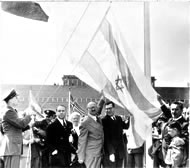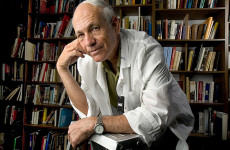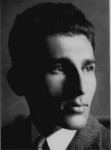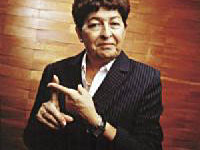
IsraCast presents a dramatic and historical audio report (with authentic recordings) of how and why Israel acquired the
Gaza Strip, the West Bank, and the Golan Heights (Israel returned Sinai to Egypt as part of the Israeli-Egyptian Peace Treaty of 1979).
IsraCast offers this report and recordings to radio stations, educational institutions, and anyone interested in the quest of the Jewish State
for independence and self-determination.
Since the War of Independence in 1948, Israel has succeeded in making peace with Egypt and Jordan, but the Palestinian terrorism still rages.
First, back to the international recognition for Jewish self-determination. The Jewish people, with ties to its ancient homeland of 3,000 years, was granted independence by the United Nations and the Palestine Partition vote of November 29th, 1947.
Narrator: The United Nations debates on the partition resolution were bitter and vehement.
Arab Delagate: The Arab states cannot tolerate this break in their unity, and this menace to their political and economic life. They are entitled to have a decisive say in all matters that affect their regional interests. Thus, they oppose the creation of a Jewish state in Palestine now, or at any future time.
Narrator: So went one Arab argument. And on November 29th, 1947.
General Assembly Chairman: We will proceed the role call.
UN Official: Afghanistan? No. Argentina? Argentina? Abstention. Australia? Yes. Belgium? Yes. Bolivia? Yes. Brazil? Yes. Bella-Russia? Yes. [Count continues under next voice over] Canada? Yes. Chile? Abstention.
Narrator: The final vote on the United Nations Palestine Partition Resolution had begun. The galleries were filled with tense and anxious spectators.
UN Official: Egypt? No. El Salvador? Abstention. Ethiopia? Abstain. France? Yes.
GA Chairman: I call on the public, and I hope that you will not have any interference on the voting on the debate. I am confident on the way you will behave in a so serious decision taken by this assembly, because I have decided not to allow anybody to interfere in our decision.
UN Official: Greece? No. Guatemala? Yes. Haiti? Yes. Honduras? Abstain.
Narrator: Some of the votes.
UN Official: Iran? No. Iraq? No. Lebanon? No.
Narrator: were hardly unexpected.
UN Official: Soviet Union? Yes. United Kingdom? Abstain. The United States? Yes. Uruguay? Yes. Venezuela? Yes. Yemen? No. Yugoslavia? Abstain.
David Essing: The news of the historic vote comes near midnight in Israel. In Tel Aviv’s Mugrabi Square, thousands of people gather to hear of the outcome. What you are about to hear now is an original recording of the ecstatic singing of “HaTikvah” by that crowd.
Reporter: A good cross-section of Tel Aviv’s population was here tonight. About 20,000 jam-packed in Mugrabi Square where loud speakers have been set up to announce the result of the important vote that’s now taking place in New York. People are standing on top of trucks and buses, hanging over balconies and out of windows, perched on top of street lamps and telephone poles, all waiting for the momentous word that may spell victory or defeat for their 2,000-year dream of a Jewish homeland. I think, I think you can hear that loudspeaker now. What it is? That’s it ladies and gentlemen, Partition passed, 33 to 13, and is this crowd excited. They’re starting their hora dances now. All over the Square little circles are forming. People are laughing and crying and shouting and whirling around in a wild Hora dance. Perhaps you can hear it now, they’re starting to sing “HaTikvah,” the Jewish National anthem, away off in a corner of the Square and gradually the Hora dances are breaking up and people are taking up the refrain of “HaTikvah.” All around me I can see Jews weeping unashamed while they sing. Let’s listen to them.
Words to “HaTikvah”: Kol ode balevav P’nimah – Nefesh Yehudi homiyah Ulfa’atey mizrach Kadima Ayin l’tzion tzofiyah. Ode lo avdah tikvatenu Hatikvah bat shnot alpayim: L’hiyot am chofshi b’artzenu – Eretz Tzion v’Yerushalayim. L’hiyot am chofshi b’artzenu – Eretz Tzion v’Yerushalayim.
Here is the text in English to “HaTikvah”: So long as within our breasts The Jewish heart beats true So long as still toward the east To Zion looks the Jew So long as our hopes are not yet lost Two thousand years we cherished them To live as a free people in our land Land of Zion and Jerusalem
David Essing: But for David Ben-Gurion, the architect of Jewish statehood, he did not join in dancing the Hora. B.G. was certain the Arabs would make good on their threat to try and destroy the Jewish State. These were his feelings: “I watched the people dancing in the streets celebrating the historic act to which we had all put our hand. I did not dance with them, though I felt with them, the emotion of the moment. They were right to dance, I thought, even though I was all too well aware, as many of the dancers must have been aware, of the dangers that faced us and the sacrifice we would suffer in defending the Statehood we had just gained. I was much concerned with the morrow. The attacks did, in fact, come the next day.” David Ben-Gurion back in 1948.
Since then, the attacks of one sort of another have never ceased. The deadly Fedayeen raids, sponsored by the Arab States, became the tactic after Israel defeated their armies. The tension and violence erupts in the Sinai Campaign of 1956. At long last, Egypt was forced to open the international Straits of Tiran to Israel’s Red Sea port of Eilat, but, on borrowed time. On Israel’s Independence Day of 1967, Egyptian president, Gammal Nasser, starts massing his army in Sinai, again threatening Israel. The charismatic Nasser inflames the Arab world with his fiery rhetoric.
[Nasser in Arabic]
Translation: If the Jews want war, welcome.
Radio Cairo takes its cue, “Nasser, Nasser, we are behind you. We’ll slaughter and burn the Jews.” [Singing in Arabic of this statement – then translation in Hebrew]
David Essing: And so, the Arabs set the stage for how Israel acquires territory. Sinai again, Gaza, the West Bank and the Golan Heights. Israel mobilizes her reserves with call-up codes broadcast on the Voice of Israel. [Codes heard in Hebrew] “Love of Zion”; “Stagelights”; “Last of the Just”, and so on. And while Israel goes on a war footing, Jews around the world rally to defend the Jewish State, once again in danger.
[Crowd heard in background]
Jewish Supporters: “if we are called upon, we are prepared to don uniforms tomorrow. Time was when Jews took upon themselves an oath, they raised their right arms and they said, and you say it with me, “If I forget thee, O Jerusalem, may my right hand be forgotten”. Repeat after me, raise your right hands, “If I forget thee, O Jerusalem, may my right hand lose its cunning, and may God be with us and with Israel.”
…All Jews, regardless of movement even if they don’t belong, and many Jews that never even thought of Israel, have never had any contact with Yiddishkeit, and they’re coming forward. They’re volunteering money, they’re sending their children, which a month ago would never have had happened, they’ve given their children the okay to come here.
…I am not frightened. I have sort of taken on some of the feeling of the inhabitants of Jerusalem.
David Essing: Nasser ups the ante by closing the Straits of Tiran in violation of international agreements, backed by the UN.
President Lyndon Johnson: The United States considers the Gulf to be an international waterway and feels that a blockade of Israel’s shipping is illegal and potentially disastrous to the cause of peace.
David Essing: That was U.S. President Lyndon Johnson. And then, there was British Prime Minister Harold Wilson.
Prime Minister Harold Wilson: It is of the view of Her Majesty’s government in the United Kingdom that the Straits of Tiran must be regarded as an international waterway through which the vessels of all nations have a rite of passage.
David Essing: But the international guarantees prove worthless. Israel is left high and dry when it comes to opening the Straits of Tiran. The UN pulls out and the Syrian, Jordanian and Iraqi armies join the Egyptian forces on Israel’s border. But then, newly appointed Defense Minister Moshe Dayan talks about time being out of joint.
Defense Minister Moshe Dayan: It’s too late and too early. Too late to react right away on the blockading of the Straits of Eilat (Tiran) and too early to draw any conclusions of the diplomatic management or way of handling the matter.
David Essing: But enough was enough. The IDF was ordered to break the Arab stranglehold. Here’s General Ariel Sharon’s orders to his forces in the South to smash the Egyptian tanks and troops which were poised to attack Israel from Sinai.
[Voice of PM Sharon in Hebrew]
Translation by David Essing: Forty B, this is Forty. Move forward, move forward at full speed and destroy everything on the way. Over. This is Forty B replying, roger and out.
David Essing: Syria steps up its shelling of Galilee from the Golan Heights. The Israeli towns and villages below were at the mercy of the Syrian gunners on the Golan plateau, which overlooks much of northern Israel. Meanwhile, Jordanian forces on the West Bank bombard Israeli civilians in Jerusalem. In the famous, or infamous telephone call, Egypt’s President Nasser tries to pull a fast one with Jordan’s King Hussein.
[V.O. in Arabic]
V.O. Translation: By God, I say that I will make an announcement and you will make an announcement and we will see to it that the Syrians will make an announcement that American and British airplanes are taking part against us from aircraft carriers. We will issue an announcement, we will stress the matter and we will drive the point home.
V.O.: Good, said King Hussein.
V.O.: A thousand thanks. Don’t give up. We are with you with all our hearts and we are flying our planes over Israel today. Our planes are striking at Israel’s airfields since morning.
David Essing: However, IDF Chief of Staff, Yitzchak Rabin, tells a different story altogether.
Rabin: Tonight we are in Romany, Bir Gafgafa and near the Mitla. Our troops now occupying Sharm el Sheik and the Strait is open. The bulk of the Egyptian army, in the Sinai, is in totally disorder but it doesn’t mean that there are not still battles going there. They are attempting to withdraw behind the Canal zone. Practically all the West Bank of Jordan which was once Palestine, is in our hands.
David Essing: And Palestinians in East Jerusalem had their hopes dashed, according to a foreign correspondent stationed there.
Foreign Correspondent: They were quite happy about everything to begin with, you know, they were jumping around and saying, we’re going to be in Tel Aviv by tonight or by tomorrow night, and they were listening to the radio and getting a lot of propaganda over it, and the first night they thought they’d shot down 100 planes, 100 Israeli planes. Anyway, by yesterday afternoon they were looking pretty sad and the people in the hotel where we were, were just on the verge of tears, some of them. Then when the Israeli troops started coming down the streets, and they saw them out of the windows, they gave orders to one of the small boys there to go around all the rooms, the main rooms, taking down the pictures of Hussein and Abdul Nasser. And they took all the. They didn’t put anything up in its place, but they took these pictures down and tore them up and then chucked them into the trash can. And then about, oh, about half an hour later the fellow in charge of the hotel came into our room and sort of looked around and he was on the verge of tears again and he said, “All these Arab kings, they’re bad.”
David Essing: For the IDF troops who had waited for weeks to face the massed Arab threat, the six-day victory was a tremendous release of tension.
[IDF soldiers cheering]
David Essing: But Chief of Staff, Rabin says, despite the Arab threat to throw the Jews into the sea, the IDF had fought the war without hatred.
Rabin: We did not fight as the Arabs did, with a feeling of hatred in our hearts, and a will to destroy indiscriminately. We fought with a positive aim of preserving the existence of this country and its people and with a sincere longing for the ultimate aim: peace in our time.
David Essing: And at the UN, then as now, things have not changed that much. Foreign Minister, Abba Eban had to make Israel’s case for winning the war.
Abba Eban: What Nasser had predicted, what he had worked for with such undeflecting purpose had come to pass, the noose was tightly drawn. And so on the fateful morning of June the fifth, when Egyptian forces moved by air and land against Israel’s western coast and southern territory, our country’s choice was plain. The choice was to live, or perish. To defend the national existence or to forfeit it for all time. Neither seeking nor receiving help, our nation rose in self defense. So long as men cherish freedom, so long as small states strive for the dignity of survival, the exploits of Israel’s defense forces on that day will be told from one generation to another with the deepest pride. Today again, the Soviet Union has described our resistance as aggression and has sought to have it condemned. There is no international, there is no accurate foundation for this assertion. We reject it with all our might. Here was armed force employed in a just and righteous defensive cause, as righteous as the defense of freedom at Valley Forge, as just as the expulsion of Hitler’s bombers from the British skies, as noble as the protection of Stalingrad against the Nazi hordes. So was the defense of Israel’s security and existence against those who sought our nation’s extinction.
David Essing: Abba Eban, back in 1967.
David Essing




